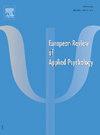进行乳房x光检查:动机清单
IF 1.4
4区 心理学
Q3 PSYCHOLOGY, APPLIED
European Review of Applied Psychology-Revue Europeenne De Psychologie Appliquee
Pub Date : 2025-01-16
DOI:10.1016/j.erap.2024.100985
引用次数: 0
摘要
本研究探讨女性同意或拒绝做乳房x光检查的动机。方法共招募310名受试者。两份调查问卷列出了接受或拒绝接受乳房x光检查的动机。不确定耐受性、担忧、焦虑、人格分别采用EII、QIPS、GAD-7、BHI-24进行评分。结果在反转理论框架下解释了7个促进因素:早期诊断兴趣、护理质量、习惯、集体主义观点、遵医嘱、伴癌、疑病信念。六个障碍被揭示出来:随行人员中没有癌症,焦虑,身体和精神上的痛苦,缺乏信息,时空困难,渴望自由。乳房x光检查的频率与年龄、子女数量、习惯呈正相关,与身体和精神痛苦、信息缺乏和时空困难呈负相关。年龄和习惯对筛查频率有正向影响,而时空困难对筛查频率有负向影响。结论本研究提供了一个更好的理解的动机,导致妇女接受或拒绝进行检查。它可能对医学专业有用,更广泛地说,对公共卫生领域有用。本文章由计算机程序翻译,如有差异,请以英文原文为准。
Perform a mammography: Motives’ inventory
Introduction
This study examines the motives of women for agreeing or refusing to have a mammogram.
Method
Three hundred and ten participants were recruited. Two questionnaires listing the motives for undergoing or refusing to undergo a mammogram were developed. Intolerance of uncertainty, worry, anxiety, personality were respectively rated by: EII, QIPS, GAD-7, BHI-24.
Result
Seven facilitators were interpreted within the framework of Reversal Theory: Interest of early diagnosis, Quality of care, Habit, Collectivist perspective, Following the doctor's advice, Cancer(s) in entourage, Hypochondriac beliefs. Six barriers were revealed: Absence of cancer in entourage, Anxiety, Physical and moral pain, Lack of information, Spatiotemporal difficulties, Aspiration for freedom. The frequency of mammography was positively linked to the age, number of children, Habit, and negatively to Physical and moral pain, Lack of information and Spatiotemporal difficulties. Age and Habit had a positive effect on the frequency of screening while the Spatiotemporal difficulties had a negative effect.
Conclusion
This study provides a better understanding of the motives that lead women to accept or refuse performing this examination. It could be useful to the medical profession and more broadly to the field of public health.
求助全文
通过发布文献求助,成功后即可免费获取论文全文。
去求助
来源期刊

European Review of Applied Psychology-Revue Europeenne De Psychologie Appliquee
PSYCHOLOGY, APPLIED-
CiteScore
2.20
自引率
20.00%
发文量
38
期刊介绍:
The aim of the Revue européenne de Psychologie appliquée / European Review of Applied Psychology is to promote high-quality applications of psychology to all areas of specialization, and to foster exchange among researchers and professionals. Its policy is to attract a wide range of contributions, including empirical research, overviews of target issues, case studies, descriptions of instruments for research and diagnosis, and theoretical work related to applied psychology. In all cases, authors will refer to published and verificable facts, whether established in the study being reported or in earlier publications.
 求助内容:
求助内容: 应助结果提醒方式:
应助结果提醒方式:


